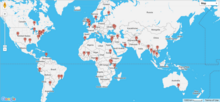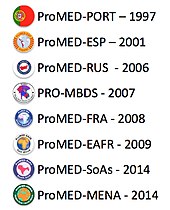ProMED mail
Program for Monitoring Emerging Diseases (also known as ProMED-mail, abbreviated to ProMED) is one of the largest publicly available reporting systems for emerging diseases and outbreaks worldwide. The central goal of ProMED is to promote communication within the international infectious disease community , including scientists, doctors, veterinarians, epidemiologists , public health professionals, and others with an interest in infectious diseases worldwide.
ProMED, founded in 1994, has pioneered the concept of electronic, Internet-based reporting of emerging diseases and outbreak detection. Since 1999 ProMED has been a program of the International Society for Infectious Diseases. As of 2020, ProMED had more than 80,000 subscribers in over 185 countries.
With an average of 13 alerts per day, ProMED provides users with up-to-date information on infectious disease outbreaks on a global scale.
One of the major global health priorities is the timely detection and reporting of emerging and re-emerging infectious diseases. Early detection can enable coordinated and rapid responses to an outbreak and prevent catastrophic morbidity and mortality. In addition, early detection can alleviate serious economic hardship caused by pandemics and emerging diseases. The increasing globalization of trade, finance, production and services has encouraged the ever greater exchange of people, animals, plants, food and feed. Other factors that contribute to the risk of new and known pathogens recurring include climate change, urbanization , land use changes and political instability. Outbreaks that begin in the remotest parts of the world quickly spread to urban centers in distant countries. The epidemiological data in the ProMED units were used to estimate the mortality rates and demographic parameters for certain diseases.
The 2003 Severe Acute Respiratory Syndrome ( SARS ) outbreak and the Middle East Respiratory Syndrome ( MERS ) outbreak in 2012 demonstrated the importance of early detection of emerging diseases. The first reports of the outbreak in both events were published by astute clinicians. The use of non-traditional sources of information can provide the international community with timely information on emerging infectious diseases that have not yet been officially reported. Disseminating information early on can result in rapid official confirmation of ongoing outbreaks. The Epicore program, launched in March 2016, uses volunteers around the world to find and report outbreaks using non-traditional methods.
history
Under the auspices of the Federation of American Scientists , ProMED-mail was received in 1994 from Stephen Morse, then from Rockefeller University , Barbara Rosenberg from the State University of New York at Purchase, and Jack Woodall, then from the New York State Department of Health (and currently Associate Editor of ProMED). Originally intended as a direct scientist-to-scientist network, ProMED quickly evolved into a prototype reporting and discussion list on Ebola outbreaks, especially after the 1995 Ebola outbreak. The idea of a global network was first proposed in 1989 by Donald A. Henderson.
ProMED played a critical role in identifying the SARS pandemic in early 2003. A Silver Spring , Maryland doctor Stephen O. Cunnion submitted the first report of this emerging outbreak to the database and enabled the ProMED community to identify the outbreak tracked almost two months before the global alert. It took the Chinese government a month to officially recognize the outbreak.
In 2012, ProMED users were again among the first to detect the MERS outbreak. Eight days after the first report, the Saudi Ministry of Health announced a diagnosis of a new form of coronavirus.
Disease monitoring and reporting
The importance of using unofficial sources of information for public health monitoring is increasingly recognized. Sometimes referred to as "event-based surveillance" or "epidemic intelligence," informal disease reporting services launched by ProMED have become a critical component of overall global surveillance of infectious diseases. According to WHO Epidemic & Pandemic Alert & Response, more than 60% of the first outbreak reports come from informal sources.
ProMED-mail publishes reports on the ProMEDmail.org website in addition to sending e-mails to service subscribers. There are no costs for subscribing to the reporting network. ProMED encourages subscribers to contribute data, respond to requests for information, and participate in outbreak investigation and prevention.
The contributions are published in real time. The reports include detailed information on infectious disease outbreaks with geotags and links to related media articles and other ProMED posts. Each report is reviewed and edited by a staff of expert moderators to ensure the validity of the information published. 45 moderators work for ProMED in 32 countries. The moderators review reports filed in their oversight region, drawing on their knowledge of the region and infrastructure to provide accurate descriptions of the outbreak event.
Since ProMED-mail is an independent program of the non-governmental, non-profit International Society for Infectious Diseases, it is ensured that a delay or suppression of disease reports by governments for bureaucratic or strategic reasons is avoided.
To provide access to a global audience, versions of ProMED are available in multiple languages and cover different regions including ProMED-ESP (Spanish), ProMED-PORT (Portuguese), ProMED-RUS (Russian), ProMED-FRA ( French), ProMED-MENA (Middle East and North Africa), ProMED-SoAs (South Asia and Arab countries), as well as the English-language versions ProMED-MBDS ( Mekong Basin region in Southeast Asia ) and ProMED-EAFR (Africa).
collaboration
In 2008, ProMED-mail and HealthMap received a grant from the Google.org initiative "Predict and Prevent". As part of this collaboration, the global network of ProMED-mail was combined with the digital knowledge of HealthMap.
Web links
Individual evidence
- ↑ ProMED-mail. In: www.promedmail.org. Retrieved May 21, 2016 .
- ↑ KM Nasner-Posso, S. Cruz-Calderón, FE Montúfar-Andrade, DA Dance, AJ Rodriguez-Morales: Human melioidosis reported by ProMED. In: International Journal of Infectious Diseases . tape 35 , June 2015, p. 103–6 , doi : 10.1016 / j.ijid.2015.05.009 , PMID 25975651 , PMC 4508390 (free full text).
- ↑ Y. Ince, C. Yasa, M. Metin, M. Sonmez, E. Meram, B. Benkli, O. Ergonul: Crimean-Congo hemorrhagic fever infections reported by ProMED. In: International Journal of Infectious Diseases . tape 26 , September 2014, p. 44-6 , doi : 10.1016 / j.ijid.2014.04.005 , PMID 24947424 .
- ↑ ProMED Experts Share Their Insights on Disease Surveillance and Epicore. In: www.skollglobalthreats.org. Skoll Global Threats Fund, accessed May 21, 2016 .
- ↑ Stephen S. Morse: Public Health Disease Surveillance Networks . In: Microbiology Spectrum . tape 2 , no. 1 , 2014, ISBN 978-1-55581-842-5 , pp. OH-0002-2012 , doi : 10.1128 / microbiolspec . OH-0002-2012 , PMID 26082122 .
- ↑ http://www.promedmail.org/post/2203332
- ↑ About ProMED - ProMED-mail. Retrieved April 13, 2020 (American English): "ProMED staff, moderators, and team are located across 32 countries and are constantly scanning for, reviewing and posting information related to global health security."



